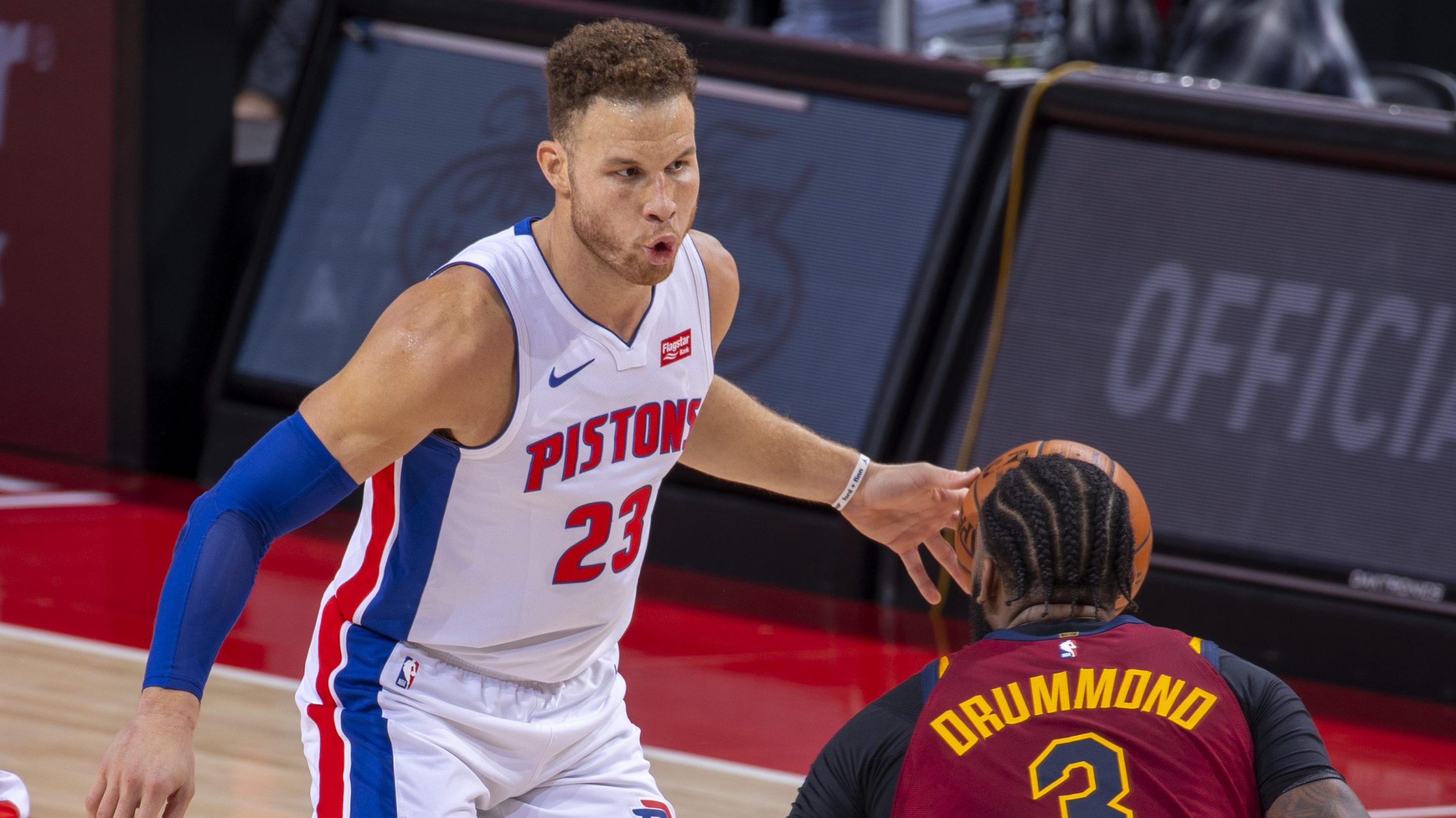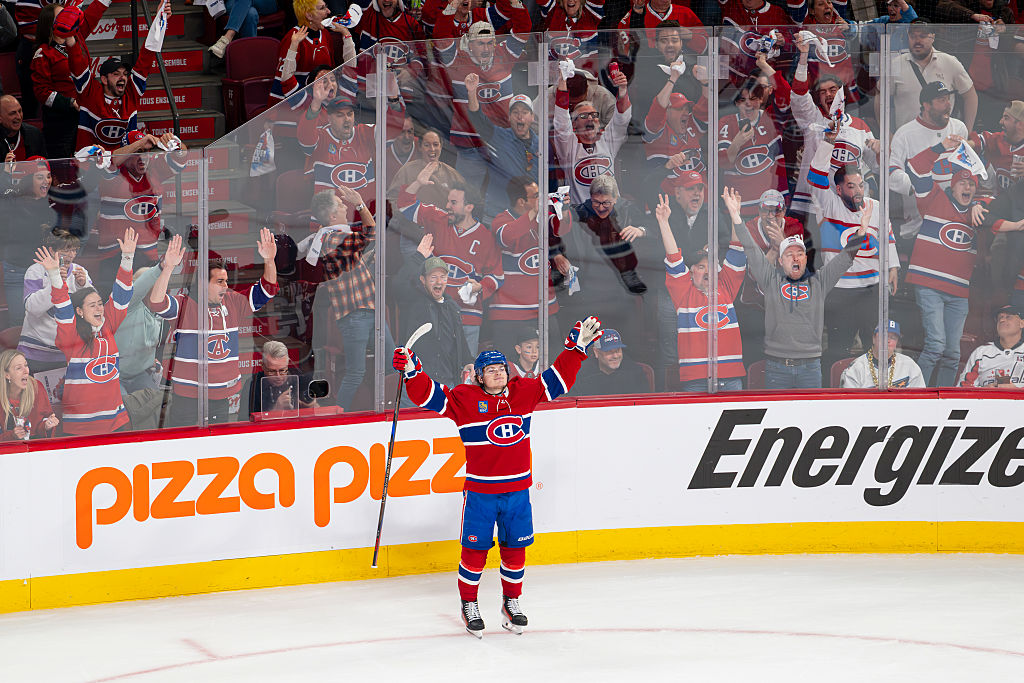Who'd like a nice hearty belly laugh? Everybody likes a nice hearty belly laugh. Let's have one together.
This isn’t merely the gripe of small-market teams, or even a matter of opinion; the Buyout Market directly (and objectively) undermines the NBA’s complex system of salary caps and luxury taxes. The whole point of all these rules is to limit how much elite talent a team can collect—and to force teams to make trade-offs and hard choices.
That's Sports Illustrated's Howard Beck with, for my money, the funniest line any piece of writing about the NBA has contained at least since The Ringer's Rob Mahoney said that James Harden requesting a trade amounted to an existential threat to the concept of teams. I'm proposing a moratorium on all NBA labor market analysis until we can figure out what the hell is going on with the basketbloggers.
What is this? You could not put this credulous dogshit—the claim that limiting "how much elite talent a team can collect" is the whole point or even a particularly salient side goal of the league's salary cap and luxury tax systems—past anyone passingly familiar with the sport's history. Who is supposed to be fooled by it?
Some context. Beck's wringing his hands over the supposed dangers and warping effects of what he terms "Buyout Season": the period shortly after the annual trading deadline, when bad or tanking teams negotiate contract buyouts with expensive veterans whom they hadn't managed to trade prior to the deadline. In recent years (and also, though the tenets of sweaty trend-warning require Beck's piece to elide this fact, plenty of not-recent years too), it's been normal to see these bought-out veterans then take minimum-salary deals with contending teams, for the sake of finishing out the season in pursuit of a championship. This month has seen Blake Griffin and LaMarcus Aldridge take buyouts, from the Detroit Pistons and San Antonio Spurs, respectively, and then sign with the Brooklyn Nets; Andre Drummond took a buyout from the Cleveland Cavaliers and joined the Los Angeles Lakers.
This, in the formulation Beck shares with the various front-office executives anonymously quoted in his piece, is especially harmful to "small-market" teams—that is to say, the coalition of franchises whose billionaire owners prefer not to have to actually compete for the services of the sport's most valuable workers. He quotes "a general manager with a small-market team" as saying, of the buyout market being allowed to exist, that "you're just helping the rich get richer." The idea here is that big coastal markets are advantaged, and smaller ones disadvantaged, by a dynamic in which, say, the Lakers know they needn't bother paying out a rich trade haul to the Cavaliers in exchange for Drummond, since they can just wait a few extra days for the Cavaliers to buy him out and then sign him for a relative pittance: less than $800,000 for the rest of this season, far less than the nearly $29 million he'd been due in salary prior to the buyout. Absent the buyout, the Lakers, with one of the highest team payrolls in the sport, could not have acquired Drummond in March without trading away big chunks of their roster in order to fit Drummond's huge salary under the cap.
I can spot a few problems here. Can you? Let's stick with the Drummond example, since it's the one Beck leans on for his argument. Drummond signed his five-year, $130 million contract—the one the Cavaliers just bought him out of; the one that entitled him to a gargantuan $28.8 million 2020-21 salary—way back in 2016, when he was a member of the Detroit Pistons. Most observers and analysts immediately regarded it as an extravagant overpay. By the time the Pistons traded Drummond to the Cavaliers, in February of 2020, he'd already depreciated sharply: Detroit received Brandon Knight (woof), John Henson (double-woof), and a 2023 second-round draft pick (worthless, but also in retrospect by far the most valuable part of this package, since Knight and Henson have both played their way out of the league) in return for him.
The Cavaliers did not have to trade for Andre Drummond; nothing compelled Cleveland's front office to do it beyond its own judgment that this was a risk worth taking. If, just a little over a year later, the Cavaliers found they could not get either $29 million worth of play out of Andre Drummond on the court, nor $29 million worth of assets for him in a trade, all that does is confirm that a self-evidently stupid decision by one of the league's most inept organizations was, in fact, stupid. If there's any compelling argument for why in particular the Cleveland Cavaliers' front office should be protected from having to draw water downstream from where it freely and voluntarily took a shit the NBA equivalent of a few minutes ago, Beck can't be bothered to make it: It's enough to invoke the plight of the poor, distressed small markets, bravely chug-chug-chugging along in the wake of the big coastal meanies, and trust that his readers will buy it as a morality play.
Never mind that the Orlando Magic, a fellow "small-market" team, managed to trade away all-star center Nikola Vucevic, Drummond's superior in any sane reckoning, on deadline day, to the Chicago Bulls, residents of the league's third-largest market, for a recent lottery pick (Wendell Carter Jr.), two future first-round picks, and a capable veteran (Otto Porter Jr.). I suppose you're meant not to consider the reality that, salary figures and cheap counting stats notwithstanding, Drummond is just a broadly not very useful player who couldn't even improve the fortunes of the apocalyptic Cavaliers and who hasn't shown any meaningful improvement in years; that his trade value irrespective of his salary figure is far lower than it was even when the Cavs paid a pittance to acquire him 12 months ago; and thus that if not for the possibility of buying him out the Cavs would be obligated for the rest of the season to a very expensive veteran they'd already been paying not to play for weeks prior to the trade deadline. No, it can only be that the Cleveland Cavaliers had a moral right to $29 million worth of compensation for Downmarket Enes Kanter, and it's been stolen from them by a system rigged to benefit coastal frontrunners.
This is a theme across Beck's examples. Blake Griffin, whom the Nets scooped up after the Pistons bought him out of his $32.7 million salary, is a ghostly echo of the player he used to be: owner of a truly gut-churning .471 effective field goal percentage, a 10.7 PER, and a perfect 0.0 VORP, according to Basketball Reference. Which is to say that he is, in the most flattering possible estimation, an exactly replacement-grade 32-year-old below-the-rim jump-shooter who defends zero positions and hasn't been able to stay healthy in years. Were the Pistons going to trade him for $32 million worth of assets, if not for that dang meddling buyout market? Were the ring-chasing Nets going to part with absolutely any significant cache of players or draft picks to acquire one of the very worst veteran players in the league?
Ditto LaMarcus Aldridge, a 35-year-old with plentiful chronic lower-body problems who's been in steep, unmistakable decline for four straight years and whom the Spurs had been paying to stay away from the court for most of a month before buying him out last week. This is the "elite talent" Howard Beck and his team executive sources worry—in entirely good faith, I'm sure!—the powerful coastal markets are hoarding, thanks to the ability of veteran players to ask to be bought out of their contracts: the washed-up owner of the 348th-highest net rating (-5.6) in the NBA.
But wait a minute! Why didn't the Cavaliers, Pistons, and Spurs just ... not buy Drummond, Griffin, and Aldridge out of their contracts, if buyouts are so damaging to their interests as small-market strivers? Why, they're hostage to evil agents, of course:
“It’s very, very hard for the small markets or mid markets to say we’re not gonna buy you out,” said one small-market GM, “because you can’t get players there anyway. If you don’t do them favors, an agent will say, ‘I’m not gonna bring my guys to you.’”
I do not find this particularly convincing on its own terms. There's a sort of creepy fantasy at play, here, where professional basketball players are dopey idiots being led around the NBA map by the agendas of their agents; if the events of recent years have not disproved this nonsense for you, here is a list of players represented by Andre Drummond's agent, Jeff Schwartz. Keep track of how many of them he "brings" to the Cleveland Cavaliers over the next few years, in exchange for their cooperation on the Drummond buyout. Something tells me that the GM who gave that quote to Beck is well aware of the fact that he overstated the influence agents wield over their clients, but did so anyway because it's much more palatable to blame the boogeymen agents than to come out and say, "I'm tired of having to give a damn about what sorts of opinions free agents might have of me."
The premier free-agent players, the ones with the leverage to choose where they'll play, are not breaking a tie between Minnesota and a sexy coastal market like Miami on the basis of which organization has a better track record of offering buyouts to their agents' other clients. There isn't a tie between Minnesota and Miami in the first place, because Miami is Miami and Minnesota is not. The only way Minnesota could introduce the kind of equilibrium that might send that decision to tiebreakers in the first place would be to pay the Not Miami Tax: to outbid the Heat straight up, to negate the personal and professional benefits of being young and rich and famous and in a place like Miami (or Los Angeles or New York).
Everything else is downstream of that. Where the top players go, the lesser ones will follow when they can, for all the same reasons the sexier cities are sexier to the superstars, plus the chance to play alongside the superstars and have fun and contend for championships. (It's worth noting that of Beck's three buyout-market cautionary tales, only Aldridge didn't arrive in his "small market" city via trade. Aldridge had options ... and chose the Spurs, the NBA's stablest and most successful organization over the past quarter-century despite the supposed structural disadvantages of toiling in one of the league's smallest markets.) Yet you do not hear any of these anonymous front-office executives rightly identifying the salary cap and the max contract rules as their enemies—only the stuff that gives leverage to players.
This gives the lie to Beck's earlier claim about the "whole point" of the cap and luxury tax. None of that stuff is about limiting the ability of large-market behemoths to hoard elite talent on their rosters; if anything, the cap and luxury tax facilitate the concentration of talent in the league's premier markets, by artificially limiting what the various Utahs and Minnesotas of the league can do to counteract what makes those markets such attractive draws in the first place. If parity or balanced talent distribution were the sacrosanct values of the league, the so-called small-market owners would be united in their opposition to the cap, the luxury tax, and contract maximums. The point of those systems isn't the red herring of parity; it's to depress player salaries and protect owners from having to compete with each other. For a professional journalist not to see this is fucking disgraceful.
The warping effect, here, belongs to the fundamentally bizarre, artificial snow-globe ecosystem of sports. Shift all of this stuff one or two degrees to get a better perspective on it. Imagine that NBA players are people, with jobs and careers. Imagine that their agents, like Leonardo DiCaprio's or Beyoncé's or Stephen King's, are not zookeepers or puppet-masters but rather employees whose job is to advance their clients' interests; imagine that what an agent says on a client's behalf is, in broad terms, what that client wants said, or in service of that client's goals. A worker under contract is unhappy at a chronically unsuccessful, underperforming, mismanaged company. The worker comes to management (via their agent, if you like, or you can treat the agent as just an expression of the worker's intentions) and asks to be bought out of their contract so that they can seek a job at another company that is not only better run and more successful, but also located in a frickin' sweet warm-weather city where the worker can live near a beach and hang out with lots of cool people. The boss can say "No, you must work here or nowhere," but the boss knows that this would further damage the perennially shitty cow-town dump of a company's reputation among skilled and valuable workers; it's already hard enough to lure those kinds of workers to their perennially shitty cow-town dump of a company in the first place. For whom is this setup unfair?
Outside of North American professional sports leagues, the chronically unsuccessful, underperforming, mismanaged company will simply go out of business unless it shapes the fuck up and becomes the kind of place where good workers can do good work and feel they're being treated well and compensated fairly; it may have to pay a premium to do it, but the alternative is that good workers will scorn it and potential customers will not buy its garbage product and it will die. Meanwhile, the well-run competing company in the cool place will thrive, and have more money, and be allowed to spend that money as it sees fit on gobbling up all the best workers in its industry.
Only in a sports league run like the NBA does the busted trashcan of a company not have to fear this dynamic: It gets a share of the successful company's revenues, and it gets to borrow the successful company's popularity a few times a year when the latter is forced to come work in the former's (publicly financed) workplace. It gets the privilege of just claiming for itself the most desirable young workers to enter the industry each year, as a reward for failure, and then the further privilege of controlling those workers for up to the first five years of their careers.
And when the shit company's owners feel resentful at falling too far behind their competitors, the two parties can pretty much always agree on what it'll take to restore harmony in their class: less mobility and leverage for workers.
Some team executives have pushed for reform, to no avail. One suggestion is to make buyout players ineligible for the playoffs unless they have been released at some date before the trade deadline—say, in early February—thus incentivizing teams to trade for the players. Another option would be to create a compensation system, in which the team signing the player has to send a draft pick (or possibly multiple picks, depending on the player) to the player’s former team. A third proposal would be to give each team a cap exception specifically for buyout signings—and limit it to one per season, or even one every two years. A fourth option would be to have teams place a blind bid for bought-out players, using whatever cap room or cap exceptions they have available, with the player awarded to the highest bidder.
And then after all that, they don't even have to carry their own water! Professional journalists do it for them. That's a pretty sweet deal, all in all. I don't see what they have to complain about.






